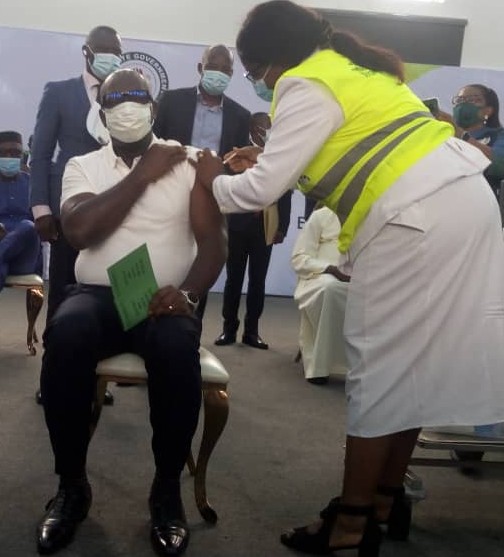Edo State Governor, Mr. Godwin Obaseki, yesterday, called on the citizens of the state to make themselves available to be vaccinated against the dreaded Coronavirus disease just as he assured them of its safety.
He made the call while taking his first dose of the COVID19 vaccine as a mark of flagging off the COVID19 vaccination exercise in the state.
Those who also took their jabs along side with the governor were his deputy, Philip Shaibu, Mrs. Betsy Obaseki, Mrs. Mariann Shaibu, religious and traditional leaders.
Mr. Obaseki said he decided to take the first dose of the vaccine to boost the confidence of the citizens of the state despite calls from friends not to take it following the news from some countries that they have suspended their vaccination exercises owing to the negative impact it has had on their citizens.
READ ALSO: 2023: PDP In Edo Wants Presidency Zoned To South-South
“At this juncture, let me explain why we didn’t start on time but to start up about an hour late, as at this morning when I was coming from Lagos, I received not less than 10 messages, advising that I should not take this vaccine that it was not safe and some of these messages came from people abroad and that there are so many countries where this particular vaccine has been put on hold and it’s being checked and tested that in South Africa for instance, the doses meant for them have been rejected and so they are pushing the vaccine to Nigeria.
“So, I have to call the expert, fortunately, as you know Edo is very blessed with people with human capacity that understand the issues in this area and under the last one hour, we exhaustively gone through all the so-called risk issues relating to this vaccine and yes, it may not be hundred percent full proof, yes, there may be some issues because more than one billion people on earth cannot have the same body constitution, however, on the balance of risk, this vaccine is safe”, he said.
Obaseki said it is normal for people to attain fears, adding that such happened when the vaccine for the eradication of Polio was first introduced into the country.
READ ALSO: Celebrity Journalist, South African Institute Enter MoU To Train Media Practitioners In Nigeria
“When the polio vaccines were introduced years ago, the same fear were expressed, however the world went ahead with vaccinating against polio. It may not have been 100 percent but today we have been able to kick out polio from our society.
“I decided this morning against all pressure to make myself available to take the vaccine, and I have done so.
“It is a painless exercise and I will be surprised if there will be any side effects”, he said.
The state governor said the state has received 81,0 80 vaccined which will be administered in two doses and that such means that the state is set to inoculate not less than 40,000 people in its first phase.
READ ALSO: Reps To Make B.SC, HND Minimum Qualifications For Offices Of President, Governors
He added that the importance of the exercise can never be over emphasized as it is very crucial to the survival of people particularly frontline workers, the elderly and those who are living with cold morbidity.
He said the vaccination against the virus will help boost immunity.
“This exercise has started today and it will continue through the week and during this time, we intend to get the vaccine to people in the frontline in our hospitals and other relevant health facilities, also we will vaccinate leaders and key stakeholders in the society to boost public confidence in the efficacy of the vaccine.
“The main objective of the COVID19 vaccination exercise is to accelerate the spread of our health immunity which will ultimately slow down and interrupt the transmission of COVID19 in the state and in the entire country”, he said.
